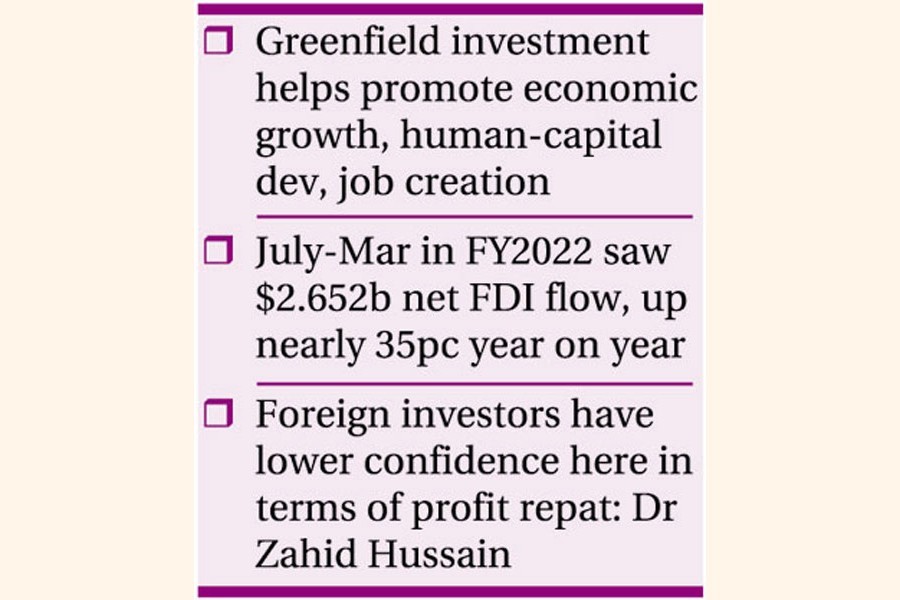Bangladesh has been tracked as one of the bottom-placed countries in attracting 'greenfield' foreign direct investment, as recorded in 2021, for factors like disharmonious regulations and profit-repatriation unease.
According to Greenfield FDI Performance Index on global ratings, Bangladesh scored 0.30 in the index in 2021 against top-performer Costa Rica scoring 15.5 in the year under review.
"Greenfield" investment is a type of FDI in which a parent company creates a subsidiary in a different country, building its operations from the ground up. In addition to the construction of new production facilities, these projects can include building new distribution hubs, offices, and living quarters.
The Greenfield Performance Index uses a methodology devised by UNCTAD for overall FDI, and applies it to only greenfield FDI, excluding M&A, intra-company loans, and other forms of cross-border investment.
The 7th edition of the Greenfield FDI Performance Index, published this August, however, shows the score was 0.31 in 2020 for Bangladesh.
A score of 1.0 indicates a country's share in global inward greenfield FDI matches its relative share of global GDP. A score greater than 1.0 indicates a larger share than indicated by its GDP and a score of less than 1.0 indicates a smaller share.
A number of studies conducted by different international development agencies show that such FDI inflow can promote economic growth, develop human capital, and create employment by transferring management skills, knowledge, and innovative technologies.
Leading local economists, however, say Bangladesh usually remains a lower performer in terms of attracting FDIs because of unfavorable regulations, poor infrastructure, and lack of skilled manpower.
"The barriers are not new, and uttered by many, many times, but there was no improvement," says Dr Zahid Hussain, a former lead economist at the World Bank.
He notes that there are some improvements in easing the regulations. These are, however, actually on papers, not in reality.
"We've seen some amendments in the foreign-exchanges regulations, but the real experience is not good."
Dr Hussain mentions that foreign investors have lower confidence in terms of repatriating profits.
The 10 worst-performing nations are China, Japan, Bangladesh, Pakistan, South Korea, Indonesia, the United States, Norway, Russia, and Taiwan.
Iraq, Italy and Ecuador came out on the list of bottom-placed 10 economies in 2021.
Japan, the USA, and China are poor performers in the index as they stand out as the lowest-performing countries, given the size of their economies, and also for their typical hard and soft barriers to foreign investment.
In 2021, Costa Rica, the UAE, and North Macedonia were world's best FDI performers, relative to the sizes of their economies.
The other best are Singapore, Lithuania, Malta, Serbia, Poland, Hungry and Estonia.
In an analysis of the latest report of the Greenfield FDI performance index, the FDI intelligence in its August edition says that the pandemic redrew the map of the world's best FDI outperformers relative to the sizes of their global gross domestic product.
In this respect, Costa Rica is both an outperformer and an outlier as the only Latin American country in the top 10, which is dominated by major business hubs such as the UAE and Singapore, and countries in emerging Europe.
The global outlook analysed 101 locations in 2020 while preparing the Greenfield Performance Index. Of them, 75 had an index score greater than 1.0, while 26 had a score of 1.0 or less.
The Bangladesh Bank says the net FDI in July-March in FY 2022 was US$2.652 billion, up by nearly 35 per cent from its corresponding period a year earlier.
Component-wise, of the total stock, equity capital is $1.12 billion, reinvested earnings $1.44 billion, and intra-company loans $90.3 million.
However, in 2021, the global trend was that countries attracted major projects in renewable energy, as well as in the software and IT sector.


